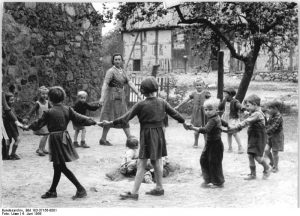strict
 Many people think of Kindergarten as almost a play date. They think of a classroom filled with toys, books, and craft supplies, as well as a playground for recess. Many people think of it as a daycare for working parents, and of course, a place for early childhood development. All these are good things, but this was not the original plan for the creator of Kindergarten, German born Friedrich Wilhelm August Fröbel. He wanted it to be a place that was both ‘a garden for children’, where children meet with environment and also ‘a garden of children’, where they play together and express themselves in a smaller garden world by means of play with their age group. He believed that “children are like tiny flowers; they are varied and need care, but each is beautiful alone and glorious when seen in the community of peers.”
Many people think of Kindergarten as almost a play date. They think of a classroom filled with toys, books, and craft supplies, as well as a playground for recess. Many people think of it as a daycare for working parents, and of course, a place for early childhood development. All these are good things, but this was not the original plan for the creator of Kindergarten, German born Friedrich Wilhelm August Fröbel. He wanted it to be a place that was both ‘a garden for children’, where children meet with environment and also ‘a garden of children’, where they play together and express themselves in a smaller garden world by means of play with their age group. He believed that “children are like tiny flowers; they are varied and need care, but each is beautiful alone and glorious when seen in the community of peers.”
I’m sure this sounds odd to most of us, but when you look at his background, I think you will understand why he felt the way he did. Fröbel had an unhappy childhood with a severe step-mother. He was abandoned and treated in a strict fashion as a child. He got to know what happiness was, when he was living with his uncle’s family while studying at high school. He had a huge desire for education, strong Christian faith and love of nature. He studied mineralogy in Jena,  Germany and architecture at the Berlin’s Humboldt University. Inborn skills of an educator helped Fröbel to realize the failure of teaching system because of its incompleteness and the failure to include the outside world in the educational process. The first kindergarten was established by Fröbel in Bad Blankenburg in 1837. He renamed his Play and Activity Institute to a ‘kindergarten’ two years later in 1840. That Bad Blankenburg Infant school used play, games, songs, stories, and crafts to encourage children’s imagination and broaden their physical and motor skills. “Kommt, lasst uns unsern Kindern leben” Come, let us live with our children’ turned into the catchphrase of the early childhood education.
Germany and architecture at the Berlin’s Humboldt University. Inborn skills of an educator helped Fröbel to realize the failure of teaching system because of its incompleteness and the failure to include the outside world in the educational process. The first kindergarten was established by Fröbel in Bad Blankenburg in 1837. He renamed his Play and Activity Institute to a ‘kindergarten’ two years later in 1840. That Bad Blankenburg Infant school used play, games, songs, stories, and crafts to encourage children’s imagination and broaden their physical and motor skills. “Kommt, lasst uns unsern Kindern leben” Come, let us live with our children’ turned into the catchphrase of the early childhood education.
Friedrich Fröbel also used studying and nurturing plants in a garden for stimulating children’s interest in the natural world. In reality, we can trace the similarities to the Montessori school system and the Pestalozzian consideration of importance to grow up in harmony with nature. Fröbel paid much attention to preparing for  further school education by training the children through the complimentary self expression, creativeness, collective involvement, and motor activity. He considered training of all the vivid faculties: artistic, imaginative, linguistic, arithmetical, musical, aesthetic, scientific, physical, social, moral, cultural, and spiritual, complete growth and harmonious development to be even more important than any kind of knowledge. Fröbel’s kindergarten system flourished globally. Most kindergartens were organized for children of all social classes, ethnic groups and religious believes, Jewish as well as Christian. Fröbel’s vision of kindergarten seems to be so familiar and proper, however it was a fresh and revolutionary look on early childhood education in his time.
further school education by training the children through the complimentary self expression, creativeness, collective involvement, and motor activity. He considered training of all the vivid faculties: artistic, imaginative, linguistic, arithmetical, musical, aesthetic, scientific, physical, social, moral, cultural, and spiritual, complete growth and harmonious development to be even more important than any kind of knowledge. Fröbel’s kindergarten system flourished globally. Most kindergartens were organized for children of all social classes, ethnic groups and religious believes, Jewish as well as Christian. Fröbel’s vision of kindergarten seems to be so familiar and proper, however it was a fresh and revolutionary look on early childhood education in his time.
 Some people have such a way with children…a gentleness really. They are so soft hearted…maybe a little too soft hearted, but you find yourself unable to be upset with them, even if they let kids get away with too much. That is always how Bob was with our girls, and in fact, if I hadn’t been much more on the strict side, they would have been completely spoiled. Bob always had a hard time with disciplining the girls. I think he always thought he would hurt them, so he either left it up to me, or he yelled at them a little, and I do mean little, bit. He wasn’t a scary guy at all, and in fact Amy, my more stubborn child, even laughed at him after a spanking he gave her when she was 5 years old, if you could call it that. He just didn’t have the heart for it.
Some people have such a way with children…a gentleness really. They are so soft hearted…maybe a little too soft hearted, but you find yourself unable to be upset with them, even if they let kids get away with too much. That is always how Bob was with our girls, and in fact, if I hadn’t been much more on the strict side, they would have been completely spoiled. Bob always had a hard time with disciplining the girls. I think he always thought he would hurt them, so he either left it up to me, or he yelled at them a little, and I do mean little, bit. He wasn’t a scary guy at all, and in fact Amy, my more stubborn child, even laughed at him after a spanking he gave her when she was 5 years old, if you could call it that. He just didn’t have the heart for it.
I can’t say that his soft heart was a bad thing, exactly. I mean, did the girls get away with a little more than they should have when they were little? Yes. Is he still a sucker for his little girls? Yes. All they have to do is say, “I love you, Daddy” and he knows he has already lost. Does that fact bother Bob? Not at all. It is simply who he is. He might try to tell people he isn’t a softy around kids, but everyone knows that isn’t so.
Everywhere Bob goes, little kids seem to come out of the woodwork. No, I don’t mean strangers, I mean the children of friends, people he bowls with, or people he works with, and of course, family members children. They are just drawn to Bob. I think that soft heart shows on his face, personally. And if you think you can hide that from a kid…well, get over it. They can read you like a book. Those little kids instinctively knew that Bob was a friend.
Not much has changed over the years, and the grandchildren know that their grandpa is going to help out in any way he can. He is the second call, after their parents, when they have car trouble or any other such problem, because if their parents can’t fix it, or can’t get there right now, their grandparents will find a way…yes, I’m a bit of a softy too. And they know that he will most likely let them get away with a little more than their parents might, simply because he hasn’t changed since their mothers were little. Once a soft heart, always a soft heart.

